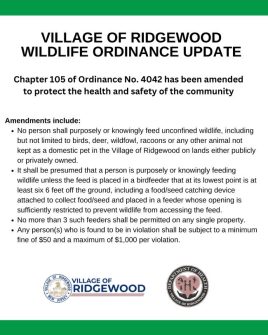
the staff of the Ridgewood blog
Upper Saddle River NJ, the New Jersey Department of Environmental Protection (NJDEP) Division of Sustainable Waste Management (DSWM) has reviewed information from the Division of Fish and Wildlife (F&W), New Jersey Department of Health (NJDOH) and other Federal and State sources, and has prepared additional guidance for counties and municipalities regarding the handling and disposal of dead birds or wildlife suspected of infection with HPAI. Be advised that the cause of death should be considered HPAI unless there is evidence of an obvious trauma, or the dead birds are songbirds.

NJDEP recommends minimizing personal, pet, domestic farm animals or other wildlife exposure and contact with dead birds or wildlife. For small numbers (1-19) of carcasses, F&W is instructing the public to reach out to their local municipality regarding disposal options. According to F&W, leaving carcasses on the landscape is acceptable if there is low risk of contact from children, pets or poultry.
If an individual elects to dispose of a carcass, they are advised to follow the procedures outlined below:
1. Wear personal protective equipment (PPE), including gloves, a mask, and eye protection.
2. Dead birds and wildlife should not be directly handled. Avoid direct contact with the carcass by using a tool such as a shovel or pitchfork to move the carcass.
3. While wearing PPE, double bag each carcass, close the bag using a zip tie, and place in an outdoor secure trash bin inaccessible by pets or other wildlife. Double bag used PPE and other disposable items potentially in contact with the carcass.
4. Following disposal, immediately wash your hands with soap and warm water and any non-disposable items that were used (e.g., shovels, pitchforks, etc.) using diluted household bleach (½ cup of bleach mixed with 1 gallon of water). Allow the bleach solution to sit on the item for 10 minutes prior to rinsing off with warm water.
If transporting HPAI suspected waste directly to waste disposal facilities:
1. Dispose carcasses using double-bagged non-porous contractor bags at an appropriate landfill or in a secure trash bin/dumpster inaccessible by other animals.
2. Care and caution must be taken when transporting carcasses to disposal sites to prevent contamination of vehicles/equipment. Precautions must be taken to prevent leakage of any bodily fluids (blood, saliva, urine, feces) or parts from transporting vehicle.
3. All non-disposable containers, tarps and coverings must be washed and disinfected with a 10% bleach solution (½ cup of bleach mixed with 1 gallon of water) allowed to sit for 10 minutes before being rinsed off with warm water. All disposable items must be double-bagged in non-porous contractor bags and disposed of appropriately. Prior to transport to the landfill, the exterior of the bags should be similarly disinfected.
4. Prior to leaving a mortality site and following disposal, vehicles must be cleaned and disinfected after each use with a 10% bleach solution (or ½ cup of bleach mixed with 1 gallon of water) and allowed to sit for 10 minutes before being rinsed off with warm water).
Sanitary Landfill is Preferred Disposal Location:
HPAI suspected bird mortalities and associated waste are classified as ID 25, animal and food processing waste. Once collected, the DSWM recommends that HPAI waste is directly disposed in a permitted sanitary landfill. If no in-county landfill is available, DSWM recommends disposal at the closest out-of-county landfill authorized to accept the waste.
For a list of NJ landfills and contacts see https://www.nj.gov/dep/dshw/lrm/aocslf.htm.
While disposal of HPAI waste in a non-landfill facility is not preferred, it may be necessary in certain instances. The Department requests that counties with waste flow control of ID 25 waste to non-landfill facilities waive waste flow requirements for disposal of HPAI waste and handle the material in a manner to avoid exposure to the material.
County Solid Waste Coordinators to Provide Guidance:
DSWM has reached out to County Solid Waste Coordinators for assistance in disseminating guidance to municipalities within their jurisdiction regarding the management of HPAI waste and is reaching out to facilities within the county regarding the acceptance of HPAI waste. Residents should be provided with contact information at both the municipal and county level for any questions related to management of HPAI waste.
DSWM is available to assist counties and to provide further communication with municipalities through its Office of Local Government Assistance.
HPAI Waste Handling/Timing:
HPAI waste should be delivered to the disposal facility within 24 hours of collection. While in storage/transit, HPAI waste must be kept protected from wildlife and the elements.
Agencies collecting and transporting HPAI waste should provide advanced notice of the delivery to the disposal facility.
Tell your story #TheRidgewoodblog , #Indpendentnews, #information, #advertise, #guestpost, #affiliatemarketing,#NorthJersey, #NJ , #News, #localnews, #bergencounty, #sponsoredpost, #SponsoredContent, #contentplacement , #linkplacement, Email: Onlyonesmallvoice@gmail.com

Does it effect VC members with bird brains?